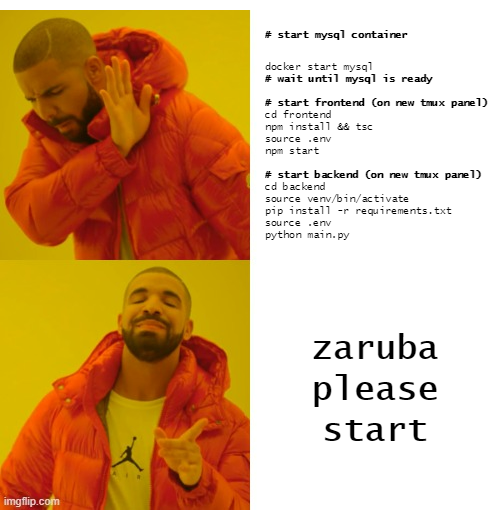⚠️ This repository is archived. Please see new Zrb repository. The new repository is re-written in Python and no longer uses YAML as configuration.
Documentation | Tutorial | Installation
Zaruba is a task runner and CLI utility. It helps you prepare, run, deploy, and debug your applications.
We believe, a good tool not only increases productivity but also changes and transforms people. In turn, a good tool will enable people to achieve their goals and open many other opportunities.
Developing/debugging a system can be challenging.
Your system might consist of several applications that depend on each other. And you need to watch every message or error logged by your applications. So, you might end up opening many Tmux panels.
Let's say you have a system with the following components:
- A frontend application
- A backend application
- MySQL
- Redis
You will need to run a lot of commands whenever you want to run your system for debugging/development purposes.
Let's take a look at the following diagram:
You can quickly notice that:
- ⛓️ You can run
Install Node Packages,Start MySql Container,Install Pip Packages, andStart Redis Containerin parallel. - 🔗 Some tasks depend on other tasks. For example:
- To
Start Database Migration, you must make sure that:- MySql Container is already running.
- Necessary Pip packages have been installed.
- To
Start Backend Application, you must make sure that:- Redis Container is already running.
- MySql Container is already running.
- Database migration has been performed.
- To
Start Frontend Application, you must make sure that the Frontend Application has been built properly.
- To
- 📐 Some tasks share similar behavior. For example, to start Redis/MySQL Container, you need to run the same command with a different set of parameters.
- ⚙️ Several tasks might share a similar configuration. For example:
BACKEND_PORTin your Frontend should reflectHTTP_PORTin your Backend.DB_PASSWORDin your backend has to reflectMYSQL_ROOT_PASSWORDin your MySQL container.
There are a lot of things you need to consider, just to run your system on your local computer.
Zaruba takes the burden from you by providing a nice task definition for your project. Thus, you will only need to run a short nice command to run everything at once:
zaruba please startInstead of opening many Tmux panels, Zaruba allows you to define and run a single task to run everything at once.
In Zaruba, you can think of tasks as DAG. A task can have many dependencies. And Zaruba will always run the dependencies first before running your tasks.
Zaruba also lets you link task environments to system environments. This allows you to configure your applications as a single system.
Let's revisit the problem we discuss in the previous section.
First, you can make a task definition like the following:
🔍 Expand to see the task definition.
tasks:
start:
dependencies:
- startFrontend
- startBackend
# 🐸 Frontend tasks
startFrontend:
location: ./frontend
extend: zrbStartApp
configs:
start: npm start
ports: 8080
envs:
BACKEND_PORT:
from: BACKEND_PORT
dependencies:
- buildFrontend
buildFrontend:
location: ./frontend
extend: zrbRunShellScript
configs:
start: tsc
dependencies:
- installNpmFrontend
installNpmFrontend:
location: ./frontend
extend: zrbRunShellScript
configs:
start: npm install
# 🐍 Backend tasks
startBackend:
location: ./backend
extend: zrbStartApp
configs:
ports: ${APP_HTTP_PORT}
start: |
source venv/bin/activate
python main.py
envs:
APP_DB_USER:
from: DB_USER
APP_DB_PASSWORD:
from: DB_PASSWORD
APP_DB_PORT:
from: DB_PORT
APP_HTTP_PORT:
from: BACKEND_PORT
dependencies:
- migrateBackend
- startMysql
- startRedis
migrateBackend:
location: ./backend
extend: zrbRunShellScript
configs:
start: |
source venv/bin/activate
alembic upgrade head
envs:
APP_DB_USER:
from: DB_USER
APP_DB_PASSWORD:
from: DB_PASSWORD
APP_DB_PORT:
from: DB_PORT
dependencies:
- installPipBackend
- startMysql
installPipBackend:
location: ./backend
extend: zrbRunShellScript
configs:
start: |
source venv/bin/activate
pip install -r requirements.txt
envs:
APP_DB_USER:
from: DB_USER
APP_DB_PASSWORD:
from: DB_PASSWORD
APP_DB_PORT:
from: DB_PORT
# 🐬 Mysql tasks
startMysql:
extend: zrbStartDockerContainer
envs:
MYSQL_ROOT_PASSWORD:
from: DB_PASSWORD
configs:
imageName: mysql
port: 3306
# 🟥 Redis tasks
startRedis:
extend: zrbStartDockerContainer
configs:
imageName: redis
port: 6379
💡🤖 Don't be intimidated by the script, You can asks Zaruba to create the scripts automatically.
Aside from the dependencies, you can also see that some of your tasks share the same environment value, for example startBackend.envs.DB_PASSWORD and startMysql.envs.MYSQL_ROOT_PASSWORD are refering to the same global environment, DB_PASSWORD.
To define the environment, you need to create .env file as follow:
DB_HOST=localhost
DB_USER=root
DB_PASSWORD=toor
BACKEND_HOST=localhost
BACKEND_PORT=3000
Then you can invoke the following commands:
# start everything
zaruba please start
# start frontend only
zaruba please startFrontend
# start redis and mysql
zaruba please startMysql startRedisYou can visit the end-to-end tutorials to see:
- How to make a working microservices-ready monolith.
- How to create CRUD features and web pages
- How to run everything on your 🖥️ local computer (as monolith or microservices).
- How to run everything on your local computer as 🐳 containers (as monolith or microservices).
- How to deploy everything on your ☸️ Kubernetes cluster.
Zaruba is focusing on helping you to write/generate/run your applications. Some of those goals are overlapped with other tools. Zaruba is not a replacement for those tools.
- Shell script: Shell script can help you to run multiple tasks sequentially. You can also use background processes to execute many tasks at once. Shell script supports control logic like branch and loop. You can think of Zaruba as a declarative framework to manage your shell scripts.
- Tmux: Tmux allows you to open multiple terminals at once. Thus it also supports parallelism. Unlike tmux, Zaruba runs your processes at a single panel.
- Screen: Screen is similar to tmux in so many ways.
- Docker Compose: Docker Compose supports parallelism. If you can define your tasks as Docker containers, Docker Compose is a good alternative to Zaruba. But, unlike Docker Compose, Zaruba also supports local processes.
- Ansible: Ansible is an automation platform. Ansible focuses on managing your servers, while Zaruba focuses on helping you to run/debug your applications. With Zaruba, you can choose to use DBMS/messaging system in the cloud or locally. Some Zaruba tasks have
runInLocalconfig that you can manage easily. - Telemetry: If you deployed your application in the Kubernetes cluster, telemetry is a good alternative to Zaruba. Telemetry allows you to run some of your services locally. This is very useful for debugging, similar to
runInLocalconfig on Zaruba. Unlike telemetry, Zaruba is also able to help you generate deployment/deploy your application.
TL;DR
sudo apt-get install golang wget curl git
sh -c "$(curl -fsSL https://raw.githubusercontent.com/state-alchemists/zaruba/master/install.sh)"
zaruba install ubuntu-essentials
zaruba install docker
zaruba install kubectl
zaruba install helm
zaruba install pulumiVisit the getting started section.
Installing from source is the best way to set up Zaruba for day-to-day use.
We don't plan to create APT or platform-specific packages for Zaruba. If you are using windows, you need to install WSL to get started.
Before installing Zaruba from the source, you need to install some prerequisites:
go 1.16or newer (To installgo, you can visit its official website)wgetorcurlgit
💡 HINT If you are using Ubuntu, you can install all prerequisites by invoking:
sudo apt-get install golang wget curl git.
To install Zaruba using curl, you can do the following:
sh -c "$(curl -fsSL https://raw.githubusercontent.com/state-alchemists/zaruba/master/install.sh)"To install Zaruba using wget, you can do the following:
sh -c "$(wget -O- https://raw.githubusercontent.com/state-alchemists/zaruba/master/install.sh)"Using docker is the quickest way to install Zaruba, especially if you need to use Zaruba in your CI/CD.
To create and run a Zaruba container on a 🐧Linux host, you can do the following:
docker run -d --name zaruba --network host \
-v "$(pwd):/project" \
-e "ZARUBA_HOST_DOCKER_INTERNAL=172.17.0.1" \
-e "DOCKER_HOST=tcp://172.17.0.1:2375" \
stalchmst/zaruba:latestTo create and run a Zaruba container on a 🪟 Windows/🍎 Mac host, you can do the following:
docker run -d --name zaruba \
-p 8500-8700:8500-8700 \
-v "$(pwd):/project" \
stalchmst/zaruba:latestFor more information about Zaruba's docker image, please visit docker hub.
⚠️ NOTE There will be some limitations if you run Zaruba container indocker-desktop. For example, docker-desktop doesn't support host networking. Thus, you need to expose the ports by yourself. (e.g.,docker run -d --name zaruba -p 8200-8300:8200-8300 -v "$(pwd):/project" stalchmst/zaruba:latest)
To get started, you can:
Some tasks need docker, kubectl, helm, and pulumi installed. You can invoke the following command to install those extra prerequisites:
zaruba install <extra-prerequisite>To see whether you need to install extra prerequisites or not, you can use this guide:
- You need docker to build, pull or push images. You also need docker if you want to run your applications as containers.
- You need kubectl to access your Kubernetes cluster.
- You need helm and pulumi to deploy your applications into a Kubernetes cluster.
- You need tocer to scaffold Zaruba's documentation.
- You need pyenv to run many
Pythonversions. - You need nvm to run many
Node.Jsversions.
To install all extra prerequisites, please perform:
zaruba install docker
zaruba install kubectl
zaruba install helm
zaruba install pulumi
zaruba install pyenv
zaruba install nvmYou can always open an issue or a pull request.
When opening a pull request, please write down:
- Zaruba version you used.
- Your expectation/goal.
- Things you have tried to achieve the goal.
- The result you get.
💡 HINT You can get the zaruba version invoking:
zaruba version.
To perform the test, you need to have:
- docker desktop
- kubectl
- helm
- pulumi
- go 1.16
- make
Once you meet all the prerequisites, you can perform:
make testHelp Red Skull to click the donation button:
Madou Ring Zaruba (魔導輪ザルバ, Madōrin Zaruba) is a Madougu which supports bearers of the Garo Armor. (Garo Wiki | Fandom)




